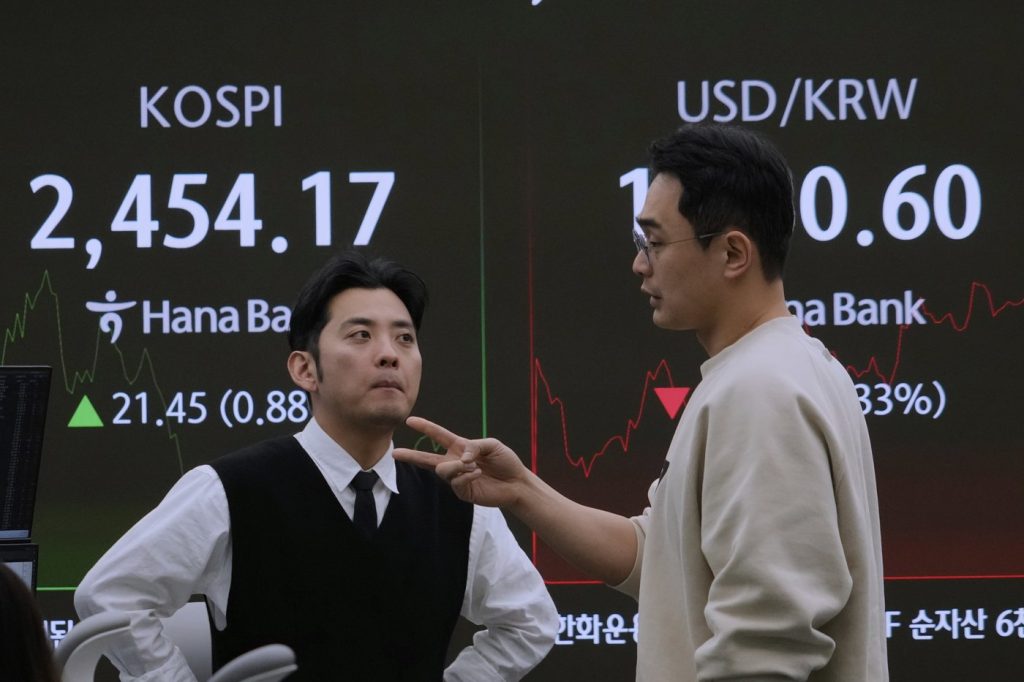Asian markets experienced a significant rally on Monday, attributed to a slight easing of trade tensions following U.S. President Donald Trump's announcement that electronics such as smartphones and laptops would be excluded from the higher tariffs imposed on certain other products. This development positively influenced U.S. futures, which surged after the U.S. stock market saw gains on Friday. Nevertheless, the weakening U.S. dollar and declining oil prices indicated ongoing concerns regarding the outcome of Trump's trade policies.
In Japan, the Nikkei 225 index rose by 1.8%, reaching a total of 34,189.37, while South Korea's Kospi gained 0.8%, closing at 2,452.42. Shares of technology companies significantly contributed to this rally, with notable gains reported for Tokyo Electron, up 2%, and Advantest, a testing equipment manufacturer, which soared by 5.4%. South Korea's tech giant Samsung Electronics also saw an increase of 1.4%.
Hong Kong's Hang Seng Index climbed 2.4% to reach 21,419.59, and the Shanghai Composite index rose by 0.9% to 3,266.26, propelled by a government report that disclosed a 12.4% surge in China’s exports in March compared to the previous year. On the trade front, President Trump’s exemption of smartphones and computers from tariffs followed China’s announcement on Friday regarding a significant hike in tariffs on U.S. products to 125%. This exchange marked another stage in the ongoing trade war.
The Chinese Ministry of Commerce described Trump's decision as a "small step" toward rectifying what it termed wrongful actions associated with reciprocal tariffs. The ministry urged Trump to eliminate the tariffs entirely. The continued rise in hostilities between the U.S. and China, two of the world's largest economies, poses risks of widespread economic damage and the potential for a global recession, despite Trump's recent 90-day tariff pause for all nations except China.
Australia's S&P/ASX 200 index gained 1.5%, closing at 7,758.70. In Taiwan, the Taiex index rose by 0.6%, underscoring the country’s heavy reliance on exports in high-tech fields such as computer chips.
On Friday, the S&P 500 Index increased by 1.8% to 5,363.36, marking a strong finish to a tumultuous week. The Dow Jones Industrial Average also climbed by 1.6%, reaching 40,212.7, while the Nasdaq composite jumped 2.1% to 16,724.46. These gains came as investor pressure began to ease within the U.S. bond market, which typically serves as a stable aspect of Wall Street but had been signaling concern in recent events.
As of early Monday, the yield on the 10-year Treasury was at 4.466%, following a notable peak of over 4.58% on Friday, a significant increase from 4.01% just a week prior. This volatility in bond yields reflects broader investor sentiment regarding potential economic stability, with the ongoing trade war raising doubts about the U.S. as a safe haven for investments.
Gold prices, meanwhile, continued to rise, confirming its status as a refuge for investors amidst the uncertainties of the trade conflict. On Monday morning, gold was valued at $3,249 per ounce, up $4.20. The prevailing trade war uncertainties are adversely affecting consumer confidence in the U.S., which could dampen spending and negatively impact the economy, which had started the year on a robust note.
While a better-than-expected report on wholesale inflation was released, indicating March price levels, concerns remain regarding potential inflation increases as Trump's tariffs begin to take effect across the economy. This scenario could constrain actions available to the Federal Reserve in managing economic policy.
Recent fluctuations in stock prices were additionally influenced by stronger-than-anticipated profit reports from major U.S. banks at the beginning of the earnings season, with JPMorgan Chase, Morgan Stanley, and Wells Fargo showcasing better-than-expected financial results for the first quarter.
In early trading on Monday, U.S. benchmark crude oil prices dropped by 20 cents, settling at $61.30 per barrel, while Brent crude also saw a reduction of 20 cents, trading at $64.56 per barrel. Furthermore, the U.S. dollar diminished in value against the Japanese yen, falling to 143.05 yen from 143.91 yen, while the euro increased to $1.1379 from $1.1320.










